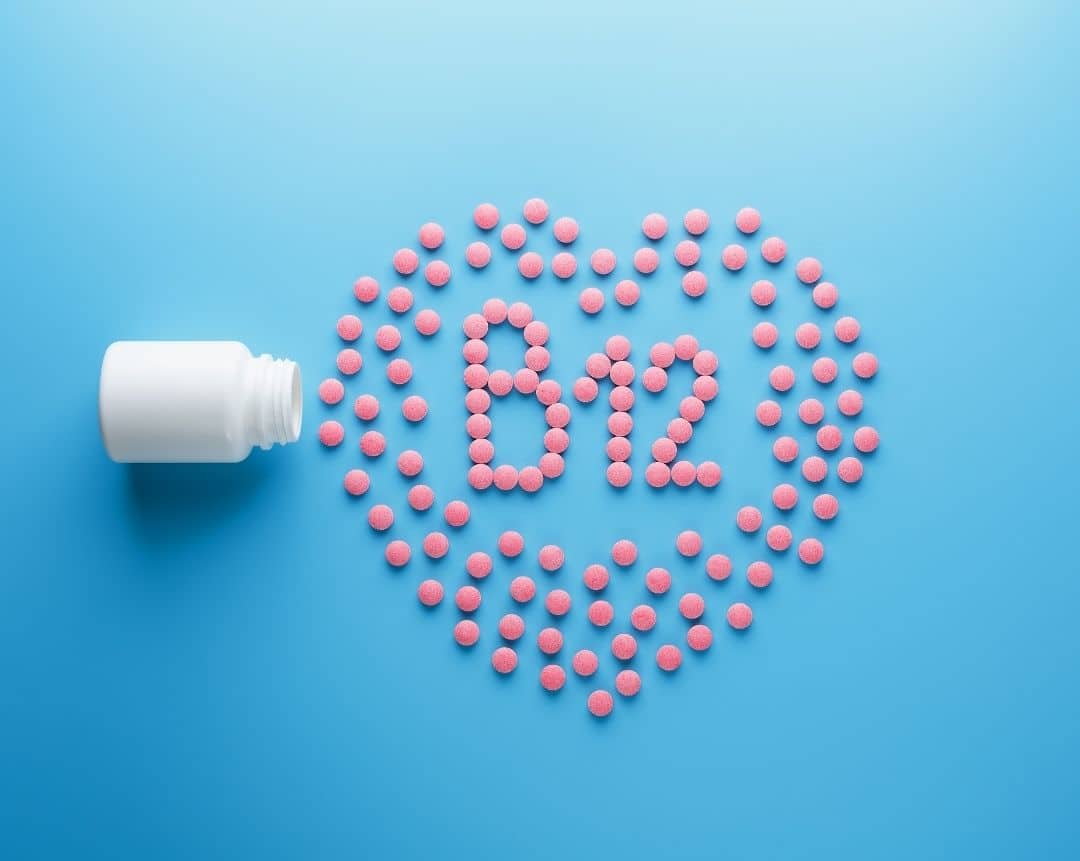We’re all too familiar with the saying “too much of a good thing can turn out bad,” and it also applies to vitamins, particularly Vitamin B12. Yes, you read that correctly; getting too much B12 might spell some trouble for your health.
Otherwise known as (cobalamin), vitamin B12 is an important vitamin that plays an essential role in red blood cell formation, cell metabolism, nerve function, and the production of DNA, the molecules inside cells that carry genetic information. It is commonly found in foods such as poultry, meat, fish, and dairy products. It is also manufactured pharmaceutically in supplement form and is often taken with other B vitamins.
The recommended daily amount of vitamin B12 is 2.4 micrograms for the average adult. A deficiency would naturally cause some health problems such as anemia, fatigue, muscle weakness, intestinal problems, nerve damage, and mood problems. This article will tackle what happens to your body when you have an excess of Vitamin B12.
Vitamin B12 is a water-soluble compound and is absorbed in the intestines, where, once absorbed, it helps create DNA and red blood cells. The remaining unused B12 is then stored in the liver. But if you take supplements, you might ingest more than what your body needs.
Can You Take Too Much B12?
While there’s no established upper limit due to its low toxicity, excessive supplementation can cause side effects like acne, rosacea, or in certain cases, more severe health issues.
Megadoses up to 2,000 mcg per day are generally safe, but unnecessary for those without a deficiency.
*As always, consult a healthcare professional before starting a new supplement regimenâ.
How to take Vitamin B12
Since the body can’t produce its own B12, you’ll have to ingest it from somewhere. You can get Vitamin B12 mainly by eating foods rich in the said vitamin. The following foods can make up a part of an excellent diet plan:
- Eggs
- Animal liver and kidneys
- Sardines
- Red meat
- Tuna
- Salmon
- Dairy products
Apart from foods, others usually take their dose of Vitamin B12 from oral capsules. Others come in the form of injectables (intramuscular) or nasal sprays. It is highly recommended for vegans to take a B12 supplement.

Possible B12 Side Effects
While a necessary vitamin, excessive amounts of B12 can sometimes cause a few unwanted side effects. Although not all of these side effects occur, they may need medical attention in the event that they do.
- Abdominal or stomach pain
- Allergic reactions (anaphylaxis)
- Bleeding from the nose or gums
- Bluish lips and fingernails
- Chest pains
- Coughing (sometimes with pinkish sputum)
- Decreased urine output
- Strained, noisy breathing, sometimes with a wheezing sound
- Swallowing problems
- Dilated neck veins
- Dizziness
- Extreme fatigue
- Drowsiness
- Eye pain
- Vision problems
- Rapid heartbeats
- Irregular heartbeats (arrhythmia)
- Headaches
- Low blood pressure
- Skin problems like hives, itching, or rashes.
- Profused sweating
- Pale skin
- Puffiness of the face, particularly in the eyelids, lips, or tongue
- Ringing in the ears
- Swelling in the fingers, feet, or lower legs
- Chest tightening
- Sudden weight gain
- Diarrhea
In some serious cases, the following also tend to occur:
- Congestive heart failure
- Peripheral vascular thrombosis
- Cardiac arrest
- Polycythemia vera (a type of slow-growing blood cancer)
- Muscular paralysis
- Pulmonary edema
- Anaphylactic shock
- An early death
Yes, you read that right. One study found that taking excessive amounts of Vitamin B12 supplements can affect and shorten one’s lifespan.
If any of these occurs after taking vitamin B12, call 911 or your local emergency services immediately.
Possible Interactions
Interactions happen when a change occurs in how a drug acts in the body when taken with certain other medicines, drugs, or supplements or when taken while having certain medical conditions. These interactions may cause the supplement to be more or less effective or cause unexpected side effects on the body.
For Vitamin B12, some agents are linked to their reduced absorption. If you’re taking any of the following, your doctor might recommend a change of prescription or a timeframe to avoid interactions.
- Vitamin C (ascorbic acid) – Taking vitamin B12 together with vitamin C might reduce the available amount of vitamin B12 in your body. Doctors recommend taking vitamin C a couple of hours after taking a B12 supplement to avoid interaction.
- Aminosalicylic acid (Paser) – While this drug is mainly used to combat digestive issues, it might hinder your body’s ability to properly absorb vitamin B12.
- Colchicine (Colcrys, Mitigare, Gloperba) – An anti-inflammatory drug commonly used to prevent and treat gout, may also disrupt the intestinal absorption of vitamin B12.
- Metformin (Glumetza, Fortamet) – A drug used with a diet and exercise program to control high blood sugar levels. A study discovered that an average of up to 30% of patients could experience vitamin B12 deficiency due to metformin use.
- Proton pump inhibitors – Taking high doses of omeprazole (Prilosec), lansoprazole (Prevacid), or other stomach acid-reducing drugs, according to a study, can significantly decrease the amount of vitamin B12 in your body.
B vitamins act cooperatively, and if one should exceed their amount, it may lead to an imbalance or deficiency in others. That said, doctors advise taking B vitamins as a complex rather than as single substance supplements. It’s also recommended that vitamin B12 supplements be taken separately from other prescribed drugs to avoid the risk of interactions and for you to get the full amount of vitamin B12.
Recommended Dosages for B12
The National Institutes of Health has recommended the following daily intake amount for Vitamin B12:
- 0.4 micrograms (mcg) daily for babies aged 6 months and below
- 0.5 mcg daily for babies aged 7-12 months old
- 0.9 mcg daily for children aged 1-3 years old
- 1.2 mcg daily for children aged 4-8 years old
- 1.8 mcg daily for children aged 9-13 years old
- 2.4 mcg daily for people aged 14 years old and above
- 2.6 mcg daily for pregnant women
- 2.8 mcg daily for breastfeeding women
Fortunately, the majority of people in the United States do get sufficient amounts of vitamin B12; however, the number of women not getting enough B12 surpasses that of men.
Who should take Vitamin B12 supplements?
People at risk of experiencing vitamin B12 deficiency are recommended for taking Vitamin B12 supplements. These include older adults, vegetarians and vegans, pregnant or breastfeeding women, those suffering from intestinal problems, dietary restrictions, and those who have had stomach surgery.
Most healthy people don’t have any need for supplementation. They can get their B12 simply by eating B12-rich foods and a healthy diet.
What to do in case of side effects
If you experience any negative effects after you start taking vitamin B12 supplements, the best thing to do is to discontinue their use immediately. It’s important to seek immediate medical attention if the side effects become frequent over time or are severe. Just switch to food sources instead.
You also can consult your doctor regarding the appropriate dosage if you don’t get enough B12 from food sources to avoid overdosage and drug interactions.
Key Takeaways
Vitamin B12 remains an important nutrient for the body to function properly and continues to be sought after in foods and as a nutritional supplement.
While most people do get enough vitamin B12 from a healthy balanced diet. Older adults, vegetarians, vegans, and people who have conditions that hinder them from properly absorbing vitamin B12 could benefit from taking them, whether they come through oral supplements, injectables, or sprays.
If you start experiencing any side effects from taking vitamin B12 supplements, you can stop taking them, and the symptoms should subside. Seek medical attention if the necessity calls for it. If you’re taking any vitamin supplements, it’s wise to watch over the amount you take in order to avoid such instances. Always consult with your doctor with matters regarding supplementation and proper dosages.











